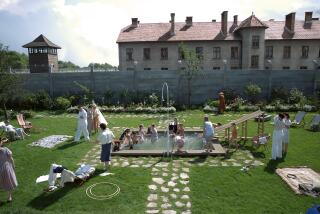Elizabeth Weinâs âRose Under Fireâ a soaring tale of triumph
You wouldnât expect a novel about a teenager in a concentration camp to be even remotely uplifting, but âRose Under Fire,â Elizabeth Weinâs follow-up to the historical blockbuster âCode Name Verity,â somehow manages to provide a sense of catharsis alongside its shock and chagrin.
When we meet Rose Moyer Justice, itâs 1944 and the Pennsylvania native is a pilot for the British Air Transport Auxiliary, delivering newly manufactured or overhauled fighter planes from factories in Southampton, England, to bases all over the country.
Sheâs exhausted but exhilarated, flush with the freedom of being far from home for the first time and in love with a boy who proudly sums her up like this for his parents: âLooks like Katharine Hepburn and flies like Amelia Earhart.â Rose is no ninny; sheâs aware of the danger and tragedy unfolding all around her, but her âbring it onâ spirit and sense of adventure practically jumps off the page. In quiet moments, she writes poetry, which appears throughout the book and gives readers an interesting perspective on Roseâs reflective side.
Aside from the occasional verse, Wein tells Roseâs story through letters and journal entries. These matter-of-fact dispatches abruptly veer from cheery to scary to bleak when Rose takes off from Franceâs Camp Los Angeles, encounters a pair of swastika-bedecked fighter planes and is bullied off course to a forced landing near Mannheim, Germany.
Looking back on the beginning of her ordeal six months later, Rose writes, with characteristic vim: âIt is a pain in the neck climbing in and out of a Spitfire in a skirt. In a million years, I bet, those German airmen would not have guessed a girl was going to climb out of that plane⌠I stood on the wing with my hands up. They all backed away respectfully, their mouths open.â
These befuddled airmen ship Rose off to RavensbrĂźck, a Nazi concentration camp in Germany for women, where she is stripped of her hair, her clothes and even her identity; despite her American passport, she is incorrectly registered as French Political Prisoner 51498.
Roseâs descriptions of what passes for life in the camp are unspeakable (and, we learn from Weinâs authorâs note, based on first-hand accounts from survivors): extreme overcrowding, intense starvation, relentless beatings, stomach-turning filth, back-breaking work, flea bites, maggots, dead bodies piled outside every door, dead bodies propped up at roll call to fill spots left by women who had disappeared or were too sick to attend.
This is difficult material for an adult; one can only imagine how a teen will navigate the RavensbrĂźck sections of this book. But itâs true, it existed, and Wein provides what appears to be a careful tour.
Amid the squalor and misery, Rose manages to make a few friends â or allies, really, since itâs impossible to imagine true friendship taking root in this hostile soil. One partner in survival is Roza, who belongs to a Polish transport of 74 girls known as âRabbitsâ for their survival of Nazi medical experimentation.
She explains, âTheyâd slice your calf open and fill the wound with gangrene and then seal it up in plaster for two weeks. Or theyâd cut pieces out of your muscles or your nerves. Or theyâd cut a chunk of bone out of your leg and try to stick it in someone elseâs leg. I am special â I got operated on five times!â
You might be wondering, whereâs the uplifting part? This comes when we see how Rose and her cohorts unite not only to survive but also to spread word of the Rabbitsâ suffering to the world.
They come up with a simple song to help them remember the name of each maimed girl, and they pledge to share the list with the first rescuers they encounter when the horror is over. That they are certain of anything, let alone that the horror will ever end, is testimony to the resilience of youth, and Weinâs tense action-packed wind-down to Roseâs story is testimony to her staying power as a writer.
âRose Under Fireâ is bound to soar into the promised land of young adult books read by actual adults â and deservedly so, because Weinâs unself-consciously important story is timeless, ageless and triumphant.
Egan is the books editor at Glamour.
Rose Under Fire
A Novel
Elizabeth Wein
Hyperion: 368 pp., $17.99, ages 14 and up
More to Read
Sign up for our Book Club newsletter
Get the latest news, events and more from the Los Angeles Times Book Club, and help us get L.A. reading and talking.
You may occasionally receive promotional content from the Los Angeles Times.







